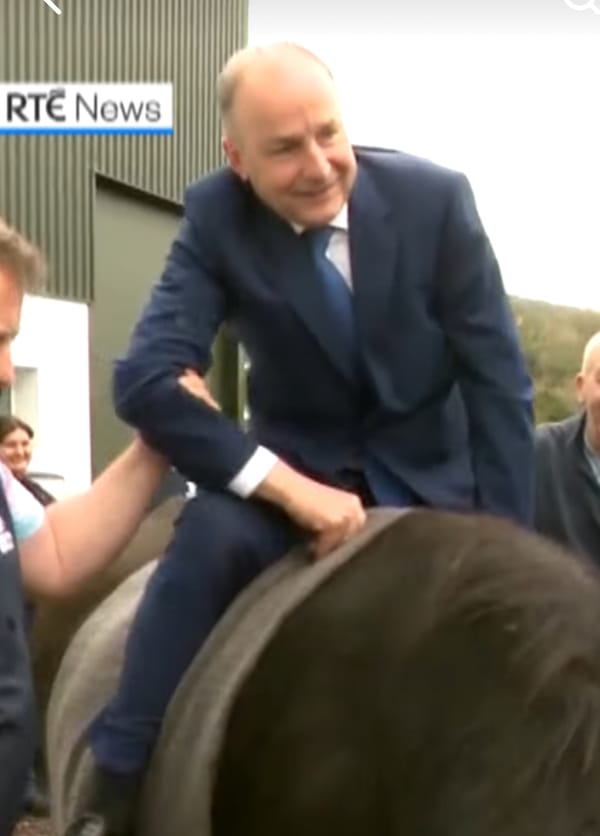The Gist: Eviction Politicians
It takes a special kind of courage to decide to make people homeless, when you could just choose not to do that. This is the Gist.

A few years back there was a vogue for describing certain elected officials as "Conviction Politicians". Tony Blair was hailed by the UN Secretary-General as a conviction politican in 2005, which we might mark as peak conviction.
Subsequently, the phrase fell out of favour as it turned out that one could also be filled with a conviction that invading Mesopotamian countries on dodgy grounds and a bag of fantasies of how occupations are experienced by the occupied was a good idea.
There was a small window when it might have been revived, albeit in a different context, while Boris Johnson faced multiple police investigations in office.
But this week saw Ireland witness the birth of a new class of public official- the Eviction Politician. After a hard week labouring down in the Landlord Mines, the government surfaced to confirm it had decided to make thousands of people of homeless.
This, to put it mildly, is not typical of the sort of public policy that is admitted to by politicians who still face the possibility of seeking re-election.
Nonetheless, there was a certain brazen energy to the government's bold new policy of deciding, as a matter of choice, to see men, women and children put out of their homes to sleep on streets, in tents and police stations or shivering in cars.
Ending the evictions ban could "very possibly" lead to an increase in homelessness, the Housing Minister has admitted.
However, speaking at Government Buildings as he confirmed the Government decision to end the emergency ban, Darragh O'Brien said that the move was a 'responsible' one. - Irish Examiner
The eviction ban was a blunt instrument intended to give a breathing space for the government to staunch the flow of people into homelessness, largely as a result of a rental market consisting of unavailable and unaffordable properties.
Here's the same Minister in January of this year:
"We brought in very significant new protections around the winter eviction ban to give us space to deliver more properties.
“I'm hopeful for this year. I'm hopeful in relation to new housing delivery.” - Irish Mirror
While Fianna Fáil (and before them, Fine Gael's) ministers' hope springs eternal on this question of delivery of houses, it turns out that, rather than using the six months of the eviction ban to feverishly try to staunch the crises, the Government had decided that was something for Future Them to worry about. Consequently, we were treated to the simultaneous announcement of some mitigation plans so unbaked that even the government spokespersons citing them couldn't agree what they might be.
The Minister repeatedly cited a plan to have local authorities buy houses with tenants in situ. This policy has been in place for some months, and has been an abject failure throughout, with no steps taken in the eviction ban pause to fix it.
The flagship mitigation proposal was to give 'first refusal' to tenants to buy the home they were renting if it was being put up for sale. Much good this would do you if you couldn't actually afford the thing, which is typically what prevents people from buying houses. But then it turned out that the Government had been doing their homework on their laps at the back of the bus on the way into the Cabinet and didn't have any actual legislation drafted, or any idea what its details would be, or when it might be passed.
The result, just to look at it again, was that the Government decided that they would see thousands of people made homeless, as a deliberate result of their public policy, so that landlords (institutional or individual) could see higher returns from their property investments.
Some turds can't take a shine, no matter how much polish is applied. Eviction politics, like conviction politics before it, seems likely to define its adherents.
The Offside Rule
The BBC is currently headed by two men. The Director General is a former Conservative Party election candidate. The Chairman facilitated an £800,000 loan to Boris Johnson.
The UK Government, determined in the face of hot competition to cede to nobody the title of being Just The Worst, announced during the week they would stop protecting people against actual slavery as part of their anti-immigration rhetoric and policy platform.
"If you come here illegally...…you can’t benefit from our modern slavery protections…" - UK PM
After he suggested that this sort of dehumanisation rhetoric was akin to 1930s Germany, Gary Lineker found himself the focus of a frenzy of faux-outrage by people who were determined that any comparisons with fascism would be stamped out, hard, and people who said bad things about the nation's leader would be stripped of their rights of free expression.
That this might prompt the onlooker to suspect those comparisons might have had some validity didn't seem to occur to them.
Anyway, the two men who deffo are not Tory Stooges at the head of the BBC decided they would keep Lineker off the screen until he recanted his criticism of the Leader. At which point, quite appropriately, It Kicked Off.
In a sort of aikido move, Lineker had managed to shift the argument over the government's treatment of powerless, nameless and vilified asylum seekers into a proxy fight where the government's proxies took him on in the refugees' stead. When two placemen of an already laughably unpopular government decide to take on Gary Lineker in the court of public opinion, it only ends one way.
Linekar is off the air, but so is the bulk of the BBC's football output as the rest of the talent simply refused to play along with their shows without him.
Perhaps more importantly, Linekar's criticisms of government's policies are implicitly endorsed every time the BBC's cabbage-brained response is criticised. We can see just how complete a rout he instigated when even the Labour opposition quietly said that maybe he ought to be allowed express an obvious historical comparison, now that they think of it.
As one BBC presenter noted, "It appears the dressing room may have been lost"



